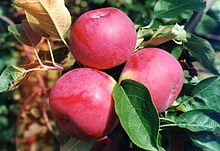Paula Red (or Paulared) Discovered by Lewis Arends near Sparta, Michigan in 1960. It was near other wild apple seedlings growing near a ravine where apples had been dumped. Tests run by experts show its parents to be McIntosh and Duchess. Paulareds mature after Duchess and before McIntosh. Hilltop Nurseries held the patent for Paulareds.[citation needed] They had a contest to name the apple with Paulared being chosen to honor “Luke” Arends's wife Pauline

Appearance and flavor
editPaulared apples are bright red with some yellow and tan spots; the skin often has a dusty sheen. They have a sprightly taste, not too sweet and not too tart, vinous and slightly reminiscent of strawberries. It has a firm white flesh that becomes soft and mealy extremely quickly as its season declines. Paula Red apples are suitable for both eating fresh and cooking, although they become extremely soft when cooked, which suits them to some dishes (applesauce) and not others (pies).
History
editThe first Paulared apple tree was discovered in 1960 by grower Lewis Arends[1] near a McIntosh block in his orchard in Sparta Township, Kent County, Michigan. He named the apple after his wife, Pauline. Paulared apples appeared on the market in 1968.[1]
Season
editThe Paulared apple is available from late August into October. It ripens with, and is often mistaken for, Tydeman's Early Worcester, another variety of McIntosh.[2]
Notes
edit- ^ a b "Paulared", National Fruit Collection
- ^ Hidden Hollow Orchard Apple Varieties – Paula Red